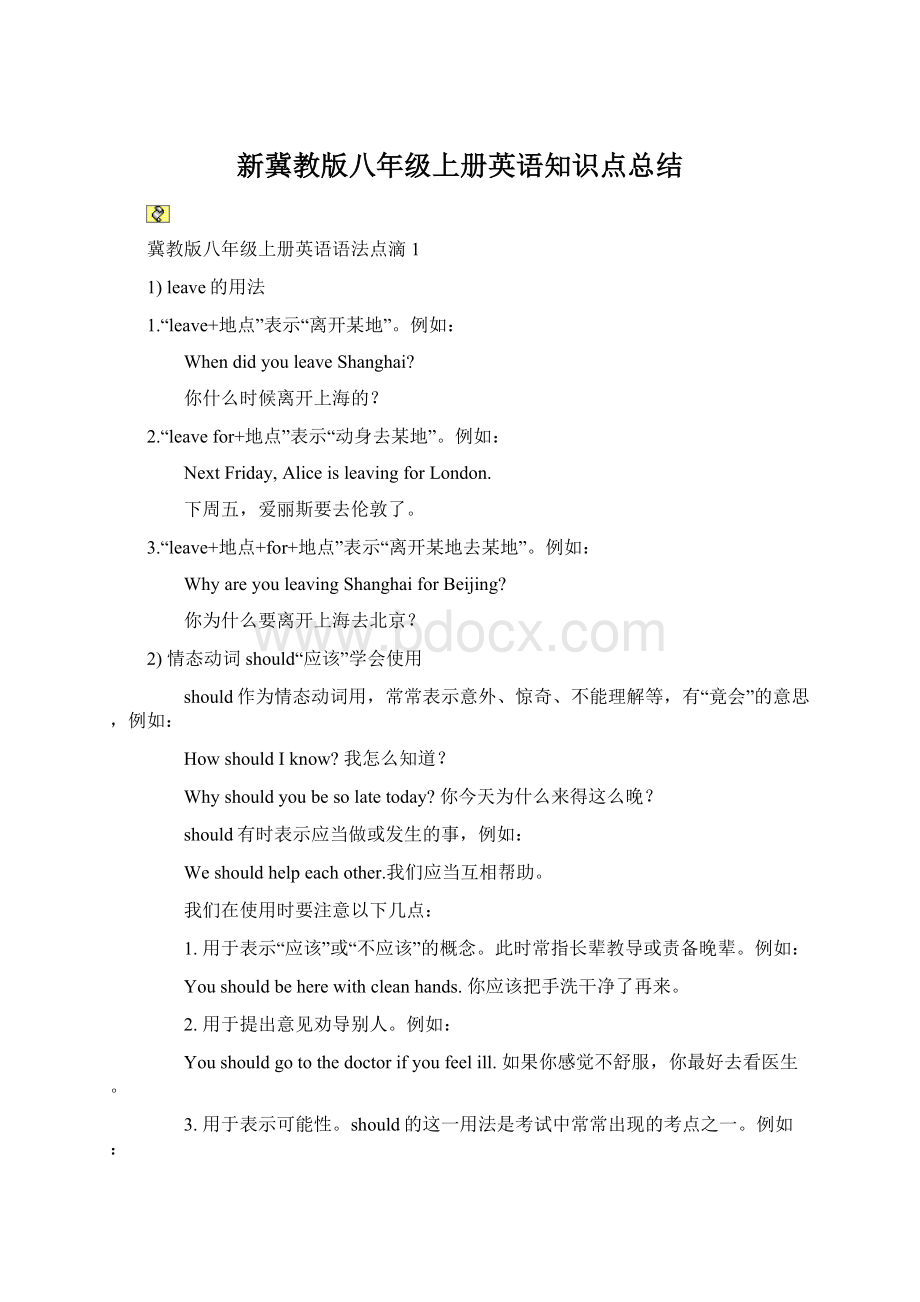新冀教版八年级上册英语知识点总结Word格式文档下载.docx
《新冀教版八年级上册英语知识点总结Word格式文档下载.docx》由会员分享,可在线阅读,更多相关《新冀教版八年级上册英语知识点总结Word格式文档下载.docx(23页珍藏版)》请在冰豆网上搜索。

你父亲是干什么的?
该句相当于:
Whatdoesyourfatherdo?
Whatisyourfather'
sjob?
Which指代的是特定范围内的某一个人。
---WhichisPeter?
哪个是皮特?
---TheboybehindMary.
玛丽背后的那个男孩。
2.What...?
是泛指,所指的事物没有范围的限制;
而Which...?
是特指,所指的事物有范围的限制。
Whatcolordoyoulikebest?
(所有颜色)
你最喜爱什么颜色?
Whichcolordoyoulikebest,blue,greenoryellow?
(有特定的范围)
你最喜爱哪一种颜色?
3.what与which后都可以接单、复数名词和不可数名词。
WhichpicturesarefromChina?
哪些图片来自中国?
4)频度副词的位置
1.常见的频度副词有以下这些:
always(总是,一直)
usually(通常)
often(常常,经常)
sometimes(有时候)
never(从不)
2.频度副词的位置:
a.放在连系动词、助动词或情态动词后面。
Davidisoftenarriveslateforschool.
大卫上学经常迟到。
b.放在行为动词前。
Weusuallygotoschoolat7:
10everyday.
我们每天经常在7:
10去上学。
c.有些频度副词可放在句首或句尾,用来表示强调。
SometimesIwalkhome,sometimeIridesabike.
有时我步行回家,有时我骑自行车。
3.never放在句首时,主语、谓语动词要倒装。
NeverhaveIbeenthere.
我从没到过那儿。
5)everyday与everyday
1.everyday 作状语,译为“每一天”。
Wegotoschoolat7:
我们每天7:
IdecidetoreadEnglisheveryday.
我决定每天读英语。
2.everyday作定语,译为“日常的”。
ShewatcheseverydayEnglishonTVafterdinner.
她晚饭后在电视上看日常英语。
What'
syoureverydayactivity?
你的日常活动是什么?
6)什么是助动词
1.帮助主要动词构成谓语动词词组的词叫助动词(AuxiliaryVerb)。
被协助的动词称作主要动词(MainVerb)。
助动词自身没有词义,不可单独使用,例如:
Hedoesn'
tlikeEnglish. 他不喜欢英语。
(doesn'
t是助动词,无词义;
like是主要动词,有词义)
2.助动词协助主要动词完成以下功用,可以用来:
a.表示时态,例如:
Heissinging. 他在唱歌。
Hehasgotmarried. 他已结婚。
b.表示语态,例如:
HewassenttoEngland. 他被派往英国。
c.构成疑问句,例如:
Doyoulikecollegelife?
你喜欢大学生活吗?
DidyoustudyEnglishbeforeyoucamehere?
你来这儿之前学过英语吗?
d.与否定副词not合用,构成否定句,例如:
Idon'
tlikehim. 我不喜欢他。
e.加强语气,例如:
Docometothepartytomorrowevening.明天晚上一定来参加晚会。
Hedidknowthat. 他的确知道那件事。
3.最常用的助动词有:
be,have,do,shall,will,should,would
7)forgetdoing/todo与rememberdoing/todo
1.forgettodo 忘记要去做某事。
(未做)
forgetdoing 忘记做过某事。
(已做)
Thelightintheofficeisstillon.Heforgottoturnitoff.
办公室的灯还在亮着,它忘记关了。
(没有做关灯的动作)
Heforgotturningthelightoff.
他忘记他已经关了灯了。
(已做过关灯的动作)
Don'
tforgettocometomorrow.
别忘了明天来。
(tocome动作未做)
典型例题
----Thelightintheofficeisstillon.
----Oh,Iforgot___.
A.turningitoff B.turnitoff
C.toturnitoff D.havingturneditoff
答案:
C。
由thelightisstillon可知灯亮着,即关灯的动作没有发生,因此用forgettodosth.而forgetdoingsth 表示灯已经关上了,而自己忘记了这一事实。
此处不符合题意。
2.remembertodo记得去做某事 (未做)
rememberdoing 记得做过某事 (已做)
Remembertogotothepostofficeafterschool.
记着放学后去趟邮局。
Don'
tyourememberseeingthemanbefore?
你不记得以前见过那个人吗?
8)It'
sforsb.和It'
sofsb.
1.forsb.常用于表示事物的特征特点,表示客观形式的形容词,如easy,hard,difficult, interesting,impossible等:
It'
sveryhardforhimtostudytwolanguages.对他来说学两门外语是很难的。
2.ofsb 的句型一般用表示人物的性格,品德,表示主观感情或态度的形容词,如good,kind,nice,clever,foolish,right。
sveryniceofyoutohelpme.你来帮助我,你真是太好了。
3.for与of的辨别方法:
用介词后面的代词作主语,用介词前边的形容词作表语,造个句子。
如果道理上通顺用of,不通则用for。
Youarenice. (通顺,所以应用of)。
Heishard. (人是困难的,不通,因此应用for。
)
9)对两个句子的提问
冀教英语在命题中有将对句子划线提问这一题型取消的趋势,现在采取的作法是对一个句子进行自由提问。
句子:
Theboyinbluehasthreepens.
提问:
1.Whohasthreepens?
2.Whichboyhasthreepens?
3.Whatdoestheboyinbluehave?
4.Howmanypensdoestheboyinbluehave?
很显然,学生多了更多的回答角度,也体现了考试的灵活性。
再如:
Heusuallygoestotheparkwithhisfriendsat8:
00onSunday.
1.Whousuallygoestotheparkwithhisfriendsat8:
00onSunday?
2.Wheredoesheusuallygowithhisfriendsat8:
3.Whatdoesheusuallydowithhisfriendsat8:
4.Withwhomdoesheusuallygototheparkat8:
5.WhattimedoesheusuallygototheparkwithhisfriendsonSunday?
6.Whendoesheusuallygototheparkwithhisfriends?
10)so、such与不定冠词的使用
1.so与不定冠词a、an连用,结构为“so+形容词+a/an+名词”。
Heissofunnyaboy.
Jimhassobigahouse.
2.such与不定冠词a、an连用,结构为“such+a/an+形容词+名词”。
Itissuchaniceday.
Thatwassuchaninterestingstory.
11)使用-ing分词的几种情况
1.在进行时态中。
HeiswatchingTVintheroom.
Theyweredancingatnineo'
clocklastnight.
2.在therebe结构中。
Thereisaboyswimmingintheriver.
3.在havefun/problems结构中。
WehavefunlearningEnglishthisterm.
Theyhadproblemsgettingtothetopofthemountain.
4.在介词后面。
Thanksforhelpingme.
Areyougoodatplayingbasketball.
5.在以下结构中:
enjoydoingsth 乐于做某事
finishdoingsth 完成做某事
feellikedoingsth
想要做某事
stopdoingsth
停止做某事
forgetdoingsth
忘记做过某事
goondoingsth
继续做某事
rememberdoingsth
记得做过某事
likedoingsth
喜欢做某事
keepsbdoingsth
使某人一直做某事
findsbdoingsth
发现某人做某事
see/hear/watchsbdoingsth
看到/听到/观看某人做某事
trydoingsth
试图做某事
needdoingsth
需要做某事
preferdoingsth
宁愿做某事
minddoingsth
介意做某事
practicedoingsth
练习做某事
bebusydoingsth
忙于做某事
can'
thelpdoingsth
禁不住做某事
missdoingsth
错过做某事
12)英语中的“单数”
1.主语的第三人称单数形式,即可用“he, she, it”代替的。
he,she,it
myfriend,
histeacher,
ourclassroom,
Tom,
Mary'
suncle
2.名词有单数名词和复数名词。
man(单数)---men(复数)
banana(单数)---bananas(复数)
3.动词有原形,第三人称单数形式,-ing分词,过去式,过去分词。
go---goes---going---went---gone
work---works---working---worked---worked
watch---watches---watching---watched---watched
当主语为第三人称单数的时候,谓语动词必须用相应的第三人称单数形式。
Theboywantstobeasalesassistant.
OurEnglishteacherisfromtheUS.
Theirdaughtermakesherbreakfastallbyherself.
13)名词的复数构成的几种形式
名词复数的构成可分为规则变化和不规则变化两种。
I名词复数的规则变化
1.一般在名词词尾加-s。
pear---pears
hamburger---hamburgers
desk---desks tree---trees
2.以字母-s,-sh,-ch,-x结尾的名词,词尾加-es。
class---classes
dish---dishes
watch---watches
box---boxes
3.以字母-o结尾的某些名词,词尾加-es。
potato---potatoes
tomato---tomatoes
Negro---Negroes
hero---heroes
4.以辅音字母加-y结尾的名词,将-y变为-i,再加-es。
family---families
dictionary---dictionaries
city---cities
country---countries
5.以字母-f或-fe结尾的名词,将-f或-fe变为-v,再加-es。
half---halves
leaf---leaves
thief---thieves
knife---knives
self---selves
wife---wives
life---lives
wolf---wolves
shelf---shelves
loaf---loaves
但是:
scarf---scarves(fes)
roof---roofs
serf---serfs
gulf---gulfs
chief---chiefs
proof---proofs
belief---beliefs
II名词复数的不规则变化
1.将-oo改为--ee。
foot---feet
tooth---teeth
2.将-man改为-men。
man---men
woman---women
policeman---policemen
postman---postmen
3.添加词尾。
child---children
4.单复数同形。
sheep---sheep
deer---deer
fish---fish
people---people
5.表示“某国人”的单、复数变化。
即“中日瑞不变英法变,其它国把-s加后面”。
Chinese---Chinese
Japanese---Japanese
Swiss---Swiss
Englishman---Englishmen
Frenchman---Frenchmen
American---Americans
Australian---Australians
Canadian---Canadians
Korean---Koreans
Russian---Russians
Indian---Indians
6.其它。
mouse---mice
appletree---appletrees
manteacher---menteachers
14)双写最后一个字母的-ing分词
初中阶段常见的有以下这些:
1.let→letting 让
hit→hitting 打、撞
cut→cutting 切、割
get→getting 取、得到
sit→sitting 坐
forget→forgetting 忘记
put→putting 放
set→setting 设置
babysit→babysitting
临时受雇照顾婴儿
2.shop→shopping 购物
trip→tripping 绊
stop→stopping 停止
drop→dropping 放弃
3.travel→travel(l)ing 旅游
swim→swimming 游泳
run→running 跑步
dig→digging 挖、掘
begin→beginning 开始
prefer→preferring
宁愿
plan→planning
计划
15)肯定句变否定句及疑问句要变化的一些词
1.some变为any。
Therearesomebirdsinthetree.
→Therearen'
tanybirdsinthetree.
但是,若在表示请邀请、请求的句子中,some可以不变。
Wouldyoulikesomeorangejuice?
与此相关的一些不定代词如something,somebody等也要进行相应变化。
2.and变为or。
Ihaveaknifeandaruler.
→Idon'
thaveaknifeoraruler.
3.alotof(=lotsof)变为many或much。
Theyhavealotoffriends.(可数名词)
→The